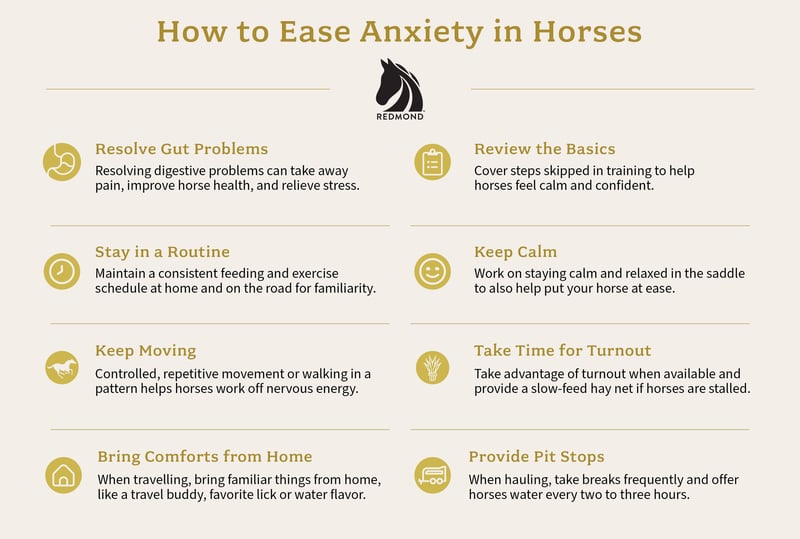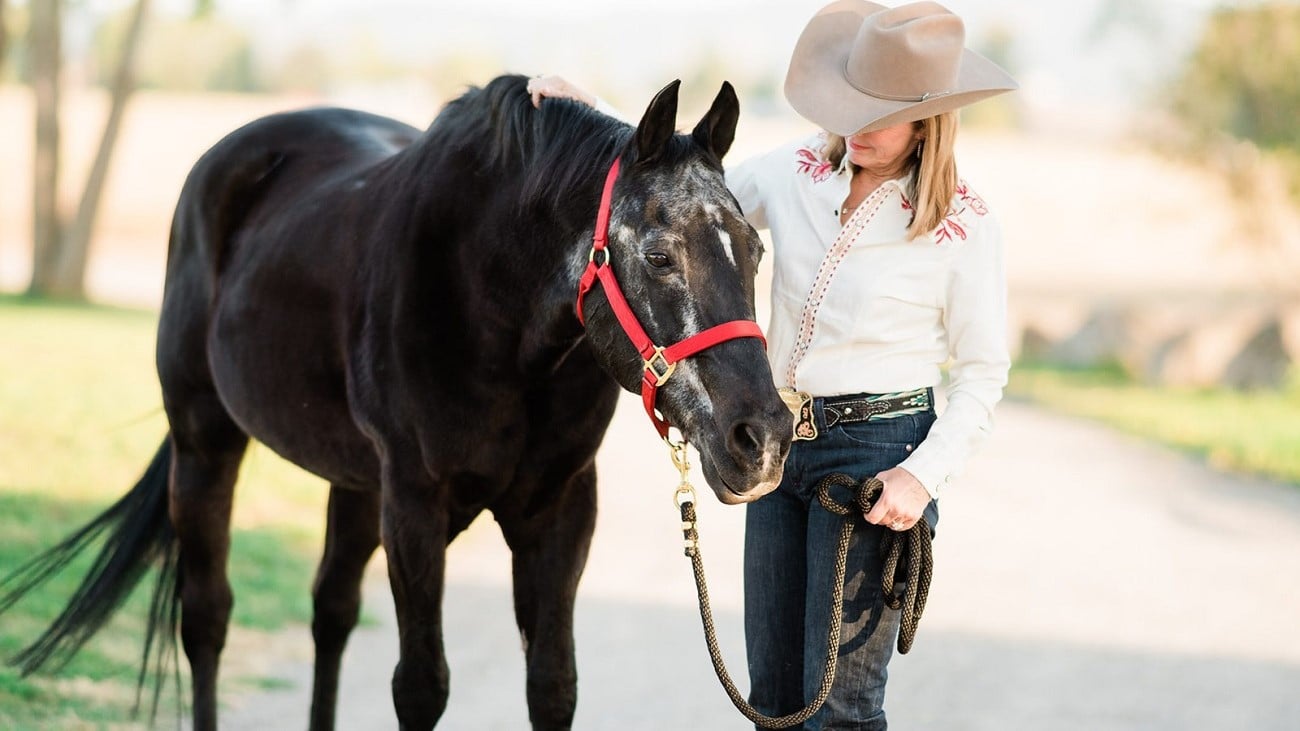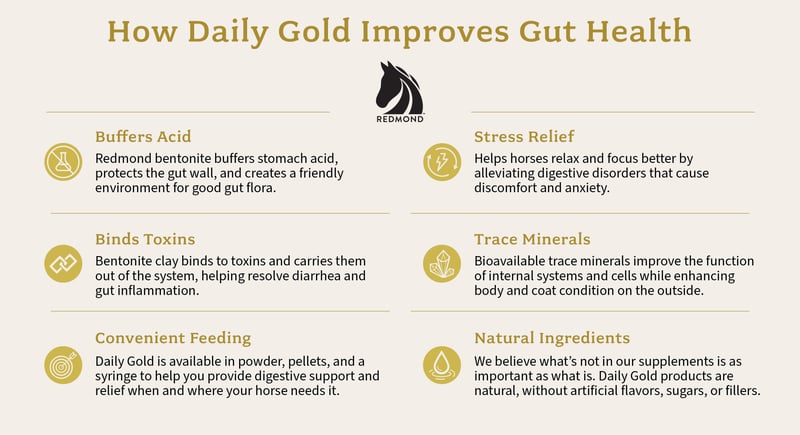Trainer Tips for Treating Anxiety in Horses
November 03, 2023
Trainer Tips for Treating Anxiety in Horses
Just like us, our horses get nervous. Whether it's the excitement of a big event, the stress of a long haul, or simply adjusting to a new routine—anxiety can affect our companions in real ways. And as you know, when a horse is anxious, it makes your time together challenging and can create difficulty accomplishing goals together.
So, what should you do to help horses feel more relaxed? How can you help them regain confidence and composure? We consulted Aimee Williams, an experienced Texas trainer, who offered helpful advice. So, pull in a deep breath and let’s take a leisurely ride through the symptoms and causes of horse anxiety… then discuss practical ideas to put you and your partner at ease.
Common Horse Anxiety Symptoms to Watch For
Horses are emotionally intelligent creatures and can become nervous for many reasons. Those jitters may be situational and temporary… or can turn into chronic symptoms if the stressors continue. While every horse exhibits anxiety in its own way, these are common nervous behaviors to watch for:
- Profuse sweating without exertion
- Reduced appetite, going off feed, or weight loss
- Refusing to drink, especially while traveling
- Frequent episodes of horse diarrhea or loose manure
- Restless behaviors like weaving, pacing, pawing, or circling the stall
- Rearing, bolting, backing up, or acting out
- Cribbing, excessive chewing, or teeth grinding
- General lack of energy or interest
- Frequent vocalizing to other horses
- Trembling or shaking
- Difficulty trailering
Now that you know what to look for, let's explore some root causes and strategies of how to help a horse with anxiety.
How to Calm a Nervous Horse Naturally
Meet Aimee Williams, the owner of Flying A Barrel Horses in Stephenville, Texas. An expert in raising and training futurity-age barrel and pole horses, Aimee has dealt with many horses of different temperaments performing in high-stress situations.
Below, she shares insights into what triggers horses with anxiety—particularly those that travel, show, and compete often—along with practical tips to help them feel calm, focused, and secure. Let's dive into her recommendations.

1. Treat Equine Digestive Disorders
Did you know a horse’s behavior is affected by what’s going on in the gut? Gastrointestinal pain and problems cause your horse stress, and stress can exacerbate GI issues, creating a vicious and discouraging cycle for you both.
“If your horse is showing signs of anxiety, digestive disorders and ulcers are the first thing to rule out,” Williams advised. “When a horse is in any kind of pain, they’re going to be apprehensive about doing their job. Ulcer symptoms can range from irritability when tightening the cinch, all the way to alleyway refusal or other performance issues.”
Helping your horse achieve a healthy digestive system is the foundation for a good partnership and a critical step in decreasing anxiety. If you suspect equine ulcers or other GI issues, consult your veterinarian for a workup and recommendations.
Redmond Product Tip: Williams both uses and recommends natural Redmond Daily Gold to help prevent gastric ulcers in her horses and ease distress from GI troubles. Available in powder, pellets or a syringe, Daily Gold buffers acid, binds harmful toxins, and helps the gut perform more efficiently.
2. Keep a Consistent Routine
All creatures, horses included, feel more secure when they have a predictable routine. When we take horses away from their familiar environment and introduce them to the competitive world, we disrupt their normal schedules.
“When staying away from home, I try to keep my horses’ daily schedule as normal as possible, including feeding and exercise,” Williams noted. “I try to feed at a consistent time each day and also offer turnout as often as possible."
Establishing regular routines your horse can predict, even on the road, encourages a feeling of order and influence over daily activities your horse will appreciate.
3. Provide Frequent Turnout & Forage
Horses are naturally built to move around and graze almost 24/7. The more turnout time and consistent, small amounts of forage you can offer, the better your horse will fare.
“Stalling a horse constantly can severely upset their mental and physical health,” Williams explained. “When a horse must be stalled, it is best to provide constant forage. This helps prevent ulcers, among other problems. So, when turnout is available, it’s important to take advantage of it, whether it be a small dry lot or multiple acres to graze. If your horse doesn’t have access to pasture, a slow-feed hay net is helpful to help stretch feeding rations throughout the day.”
4. Get Back to Basics
Our goal as riders is to instill confidence in our horses and ensure they understand their jobs well. If they don’t, it can lead to confusion. Many problems with horses misbehaving or exhibiting anxiety arise from pushing into training before they’re well-started.
“If a horse is confused about what we’re asking them to do, they’re going to feel stressed and anxious,” Williams said. “Slowing down and going back to basics is always a smart idea. Covering any steps skipped in the training process will help your horse become calmer and more confident in their job and themselves.”
5. Keep Yourself Calm
Are you a stressed rider? Do you get tense before competing? You’re not alone. Many experience nerves before climbing on a horse. Maybe it’s performance anxiety, the stress of expectations, or simply that you’re atop an animal ten times your size. Unfortunately, if you’re uneasy in the saddle, you’re likely adding to your horse’s anxiety.
“Horses notice even the slightest difference in their rider’s behavior,” Williams said. “When a rider is nervous, typically they tense up, holding the reins tighter and stiffening their back and legs. As the trainer and leader, it’s your job to reassure your horse that there is nothing to be concerned about.”
Here are a few things Aimee does to keep calm before competing: "I like to say a prayer; that helps put things in perspective. I focus on deep breaths and try to relax in the saddle. I also remind myself that we ride and compete on our horses for fun. We don’t need to take it so seriously!"
So take a deep breath and remind yourself that everything’s okay. And if finding your zen in the saddle isn’t that simple, one of these 21 tips to improve your ride and relationship with your horse may help.
6. Keep an Anxious Horse Moving
It’s hard for us humans to stand still when we’re anxious. The same is true for horses. Horses benefit from controlled movement, so letting them move in a pattern can help work off nervous energy. It also keeps them focused on the task at hand rather than the distractions around them.
“Encourage your horse to stay calm by keeping their feet moving,” Williams recommended. “Walking circles or figure eights is a great way to help them focus. Also, when we travel, our horses are usually stalled in smaller stalls than they are used to. To help compensate, we get them out and move them around as often as possible."
And if walking isn’t an option, try practicing a small, repetitive movement like lateral flexion.
“Flexing a horse laterally while standing still can help a horse stay calm and soft in the bridle by keeping their attention on the rider and her cues rather than new or stressful surroundings.”
7. Offer Comfort on the Road
Trailering and traveling can be particularly stressful for horses, where unfamiliar environments, loud noises, and distractions are the norm. It can impact a horse both physically and emotionally, causing some to go off water, feed, or experience bouts of diarrhea.
Williams offers these suggestions to reduce stress during travel:
- Take breaks and offer water every two to three hours when hauling.
- Horses are herd animals that seek companionship. Bring along a fellow travel companion to ease separation anxiety in horses.
- Provide familiar items from home, like a favorite lick on a rope or water flavor.
- Talk to your horse and offer extra attention for reassurance.
Redmond Product Tip: Daily Gold Syringe paste provides extra gut support and fast relief from digestive pain or diarrhea. Feed it during acute GI episodes or 45 minutes before trailering or other stressful events to buffer acid and coat the gut. It is a completely natural supplement that can help anxious horses feel more comfortable.
Just remember, every horse is unique! It may take time and patience to find the right combination of strategies that work. But by making your horse’s physical and emotional well-being a priority, you’ll build a more relaxed partnership and enjoy a happier, more productive ride together.
While resolving digestive issues won’t eliminate every horse’s anxiety, it does improve one critical component that allows you to focus on fixing behavior. Addressing digestive problems can take away pain, improve health, and make it easier to connect with your horse. Click below to learn more about Daily Gold powder, pellets, or syringe, and purchase today!
 About the Contributor: Aimee Williams is a professional equine trainer from Stephenville, Texas. Her facility, Flying A Barrel Horses, specializes in futurity barrel horses. She also travels and competes in that sport. Aimee lives by the philosophy that we never stop learning, and enjoys attending clinics and learning from other top barrel racers. She loves seeing equine athletes build confidence and excel in their disciplines.
About the Contributor: Aimee Williams is a professional equine trainer from Stephenville, Texas. Her facility, Flying A Barrel Horses, specializes in futurity barrel horses. She also travels and competes in that sport. Aimee lives by the philosophy that we never stop learning, and enjoys attending clinics and learning from other top barrel racers. She loves seeing equine athletes build confidence and excel in their disciplines.
Learn More
- Get additional tips from trainers on how to help stressed performance horses.
- Master horse trainer and clinician, Julie Goodnight, shares insider info on how to earn a horse's trust.
© Redmond Equine 2023. All rights reserved.
Related posts
.jpeg)
Vet Advice: 6 Common Causes of Diarrhea in Horses & How to Treat It
Diarrhea in horses can be dangerous, leading to dehydration and weight loss, even death. Here are six common causes of horse diarrhea, and how to...
December 18, 2024

How to Stop Weight Loss & Diarrhea in Senior Horses
Is your older horse losing weight or suffering with chronic diarrhea? Redmond Daily Gold supplement helps with loss of appetite and diarrhea in...




